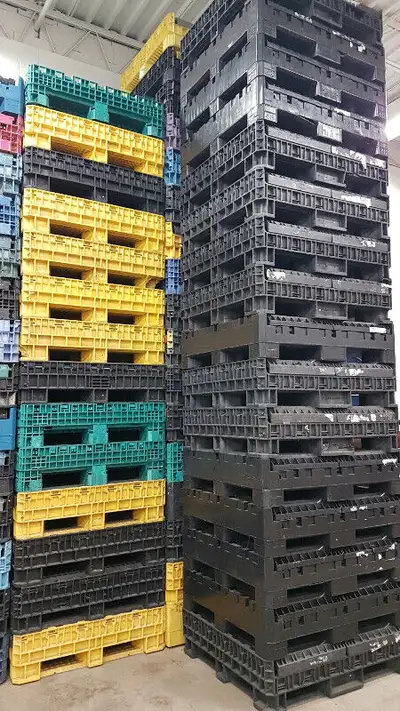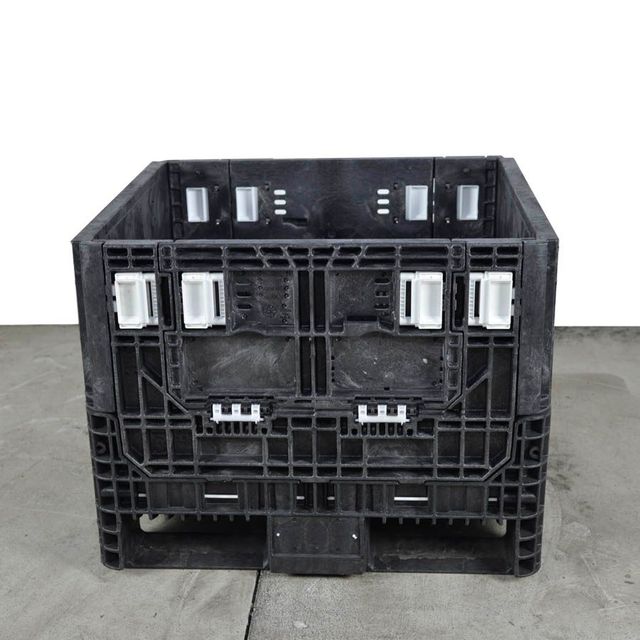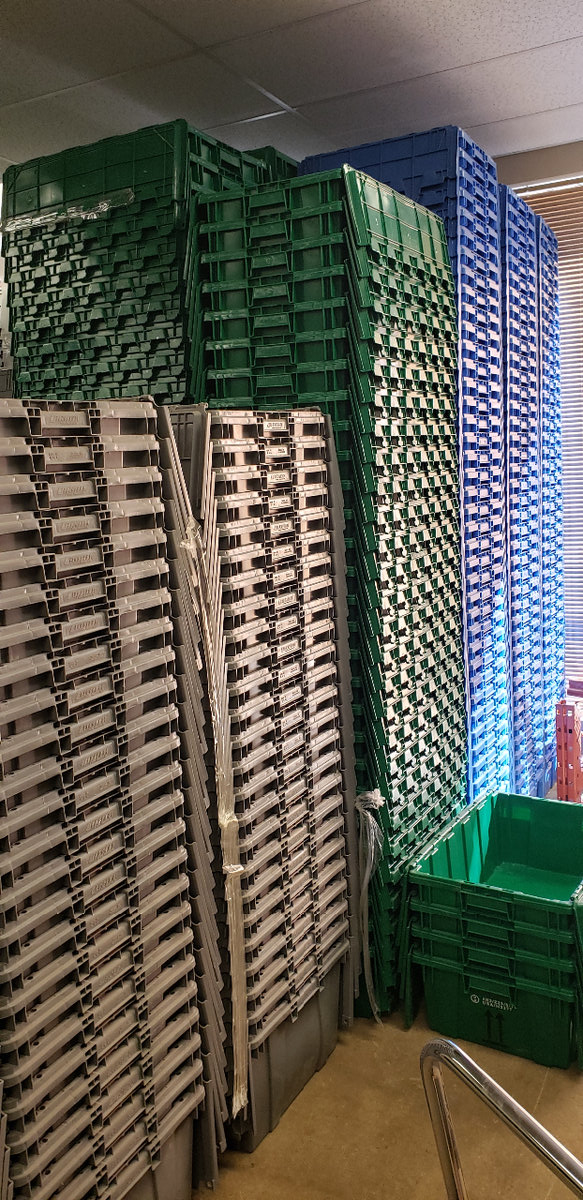The importance of used plastic containers in sustainable material handling
Why Mass Containers Are Necessary for Lasting and Affordable Transport
Mass containers play an essential duty in contemporary logistics. They assist in the effective activity of large quantities of goods, consequently enhancing transportation procedures. This method not just decreases prices yet also reduces ecological effect through lower exhausts and waste generation. As sectors seek even more sustainable methods, the fostering of bulk containers is becoming significantly substantial. What implications does this shift hold for future logistics and supply chain management?

The Benefits of Making Use Of Bulk Containers in Logistics
Bulk containers change logistics by enhancing efficiency and sustainability. These containers enable the transport of big quantities of goods in a single trip, substantially decreasing the variety of trips required. This not just streamlines operations yet also decreases labor prices connected with handling, packing, and unloading. On top of that, bulk containers are created to enhance room utilization within transport automobiles, guaranteeing that even more items can be shipped at the same time.
The standardization of bulk containers also streamlines the logistics process. With consistent dimensions, they can be conveniently stacked and stored, leading to improved stockroom monitoring. Moreover, mass containers usually feature durable materials that safeguard contents from damage throughout transportation, consequently lowering product loss and raising overall reliability. Because of this, services can experience improved supply chain performance, inevitably leading to increased profitability and customer complete satisfaction. This mix of aspects makes bulk containers a critical possession in contemporary logistics.
Environmental Influence: Lowering Waste and Carbon Impact
As markets progressively focus on sustainability, the adoption of mass containers has arised as an essential technique for lowering waste and reducing carbon impacts. These containers decrease using product packaging products, such as boxes and plastic, therefore significantly decreasing total waste generation. By consolidating deliveries, bulk containers boost transport efficiency, allowing for even more items to be moved per trip. This reduction in journeys straight associates with reduced greenhouse gas exhausts, adding to a smaller sized carbon footprint.
Mass containers can typically be recycled or recycled, even more reducing ecological impact. The longevity of these containers warranties they can withstand numerous transport cycles, minimizing the requirement for single-use alternatives. used collapsible containers. By enhancing logistics and advertising reliable source use, bulk containers not only support sustainable practices but likewise motivate sectors to straighten with global ecological goals. Ultimately, their implementation mirrors a commitment to environmental stewardship and accountable resource monitoring
Cost Financial Savings: Exactly How Bulk Containers Lower Transport Expenditures
While numerous companies seek ways to boost their profits, using mass containers offers a substantial opportunity for lowering transport expenses. Bulk containers take full advantage of the volume of goods delivered, allowing companies to ship bigger amounts at the same time. This effectiveness lowers the number of trips needed, directly reducing gas costs and minimizing labor expenses connected with loading and unloading.
Furthermore, mass containers often include streamlined styles that maximize space application within transportation lorries. This means fewer vacant spaces, leading to a lot more efficient use offered ability. The toughness of bulk containers can lower the risk of item damages during transportation, reducing losses and making certain that even more goods arrive intact.
Enhancing Supply Chain Efficiency With Mass Storage Space Solutions
Mass storage space remedies play an important role in enhancing supply chain efficiency by enhancing stock monitoring. By consolidating products right into less, larger containers, organizations can considerably decrease taking care of expenses related to constant transfers and processing. This streamlined approach enables better tracking and monitoring of stock, ultimately leading to improved functional performance.
Streamlined Supply Administration
Effective stock management is vital for optimizing supply chain operations, especially when companies embrace bulk storage space options. These remedies enable businesses to keep greater supply degrees while reducing the regularity of replenishment. By combining materials right into bulk containers, business can streamline their stock procedures, decreasing the intricacy connected with tracking multiple smaller packages. This approach assists in exact inventory matters and enhances projecting precision, enabling even more educated decision-making. In addition, mass storage remedies streamline storage facility organization, making it easier to find and gain access to items when required. Therefore, companies can attain a much more effective supply turnover rate, ultimately improving overall supply chain efficiency and lowering the likelihood of stockouts or overstock scenarios.

Decreased Handling Prices
The execution of bulk storage remedies not just enhances supply monitoring but likewise considerably reduces dealing with costs throughout the supply chain. By combining materials right into bulk containers, business lessen the need for frequent handling and transfer in between various storage and transport devices. This technique cuts down on labor expenses connected with loading, unloading, and relocating smaller packages. Additionally, mass storage minimizes check here the frequency of shipments, bring about reduced transport expenses and lowered gas usage. Because of this, services can optimize their logistics procedures, enabling an extra effective allocation of sources. Eventually, minimized handling prices add to enhanced total supply chain performance, fostering an atmosphere that sustains both sustainability and economic viability.

Flexibility of Bulk Containers Throughout Various Industries
Although several industries have distinctive requirements for transportation and storage space, bulk containers have arised as a flexible option that fulfills a broad range of needs. These containers, ranging from large containers to specialized storage tanks, can suit varied materials, consisting of powders, granules, and liquids. In the farming sector, bulk containers assist in the transportation of grains and plant foods, while the food and beverage market utilizes them for ingredients and completed items. The chemical industry counts on mass containers for safely carrying harmful products, guaranteeing compliance with safety guidelines. Additionally, building and construction companies gain from mass containers for delivering accumulations and various other materials. Their flexibility extends to different settings of transport, including trains, vehicles, and ships, boosting logistical efficiency. This versatility not just streamlines procedures across various markets yet also promotes sustainability by minimizing product packaging waste and enhancing space en route. Mass containers play a crucial role in modern-day supply chain management.
Future Trends wholesale Container Usage and Sustainability
The future of mass container usage is significantly shaped by cutting-edge products advancement that enhances sustainability. Additionally, automation in logistics assures to streamline operations, reducing waste and boosting efficiency. Embracing circular economic situation methods will certainly additionally transform how bulk containers are created, used, and reused, promoting an extra lasting transport landscape.
Cutting-edge Products Growth
As industries progressively prioritize sustainability, cutting-edge products growth in mass containers becomes a significant element in boosting environment-friendly transport remedies. Makers and scientists are checking out naturally degradable plastics, recycled composites, and light-weight metals to decrease ecological impact. These products not just decrease waste yet likewise improve gas efficiency by lowering the general weight of containers. Furthermore, improvements in wise materials, which can adapt to differing problems, improve the toughness and functionality of bulk containers. The integration of these cutting-edge products lines up with circular economic situation concepts, promoting reuse and recycling. As the need for lasting methods expands, the advancement of such products will certainly play a vital duty fit the future of bulk container usage in logistics and transportation.
Automation in Logistics
Substantial advancements in automation are positioned to transform logistics and the use of bulk containers, enhancing sustainability in transportation. Automated systems, including drones and autonomous lorries, are simplifying the motion of mass containers, reducing the dependence on standard fuel-powered transportation. These technologies maximize transmitting and loading procedures, lessening empty miles and improving fuel efficiency. In addition, automated inventory administration systems improve tracking and surveillance of bulk containers, guaranteeing far better resource allocation and reduced waste. The integration of the Web of Points (IoT) permits real-time information analysis, making it possible for positive decision-making that straightens with sustainability goals. As automation proceeds to advance, it is expected to drive further advancements in mass container use, inevitably sustaining even more lasting logistics techniques and lowering the ecological influence of transportation.
Circular Economy Practices
Improvements in automation are setting the phase for a much more incorporated technique to circular economy methods in the domain name of mass container use. As industries progressively embrace sustainability, bulk containers are being made for long life and reusability. This change not just minimizes waste but also improves source efficiency. Companies are taking on methods such as closed-loop systems, where utilized containers are collected, refurbished, and reintroduced into the supply chain. Additionally, smart innovations track container life cycles, helping with much better management and decreasing environmental influence. The cooperation in between producers, logistics suppliers, and end-users is essential in developing criteria for lasting container usage. used collapsible containers. Future patterns suggest an expanding focus on products that are recyclable and eco-friendly, further strengthening the circular economic climate's concepts in mass transportation

Often Asked Inquiries
What Materials Are Bulk Containers Generally Made From?
Bulk containers are generally built from durable materials such as high-density polyethylene, cardboard, steel, and light weight aluminum. These materials supply strength, versatility, and security, making them appropriate for delivering different products in various sectors efficiently.
How Do I Select the Right Size Mass Container?
Picking the ideal dimension bulk container entails examining the volume of materials to be transported, considering managing tools compatibility, and evaluating storage room needs. Proper size assurances effectiveness in transportation and minimizes waste throughout shipment.
Are Mass Containers Reusable or Recyclable?
Bulk containers are commonly recyclable, created for several journeys, improving sustainability. Several can likewise be recycled, depending on the materials made use of. Choosing recyclable choices additionally decreases and sustains ecological goals waste in transportation methods.
What Safety And Security Regulations Apply to Bulk Container Transportation?
Safety and security guidelines for bulk container transport consist of conformity with the Division of Transportation standards, correct labeling of harmful products, architectural integrity evaluations, and adherence to weight limitations to ensure secure handling and stop crashes during transportation.
Just How Can Services Shift to Making Use Of Bulk Containers Effectively?
Businesses can change to bulk containers by reviewing present logistics, training team on handling, investing in suitable tools, optimizing stock management, and teaming up with vendors to assure compatibility and effectiveness throughout the supply chain.
As industries progressively prioritize sustainability, the adoption of bulk containers has actually emerged as a key approach for minimizing waste and reducing carbon impacts. By consolidating materials right into bulk containers, companies can simplify their stock procedures, lowering the complexity linked with tracking numerous smaller sized packages. As markets progressively prioritize sustainability, cutting-edge products growth in mass containers arises as a considerable factor in enhancing environment-friendly transportation services. Automated systems, including drones and self-governing automobiles, are streamlining the activity of mass containers, reducing the reliance on conventional fuel-powered transportation. Furthermore, automated stock monitoring systems enhance monitoring and tracking of mass containers, making certain better resource appropriation and reduced waste.